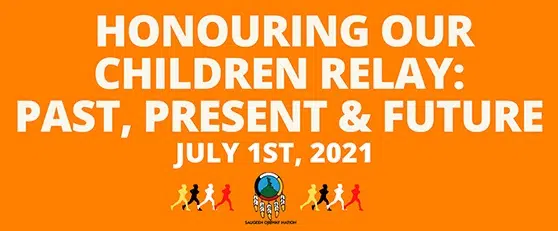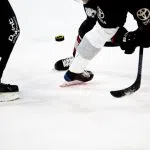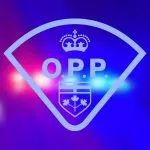Saugeen Ojibway Nation members are walking to commemorate the indigenous children whose unmarked graves are being located at residential school sites in Canada.
On July 1st, a relay is being held from Neyaashiinigmiing to Saugeen First Nation.
Relay organizers, and siblings Billy Bannick and Joss Ann Johnston say the relay has been organized by a group of community members at Neyaashiinigmiing and Saugeen First Nation.
A sunrise ceremony will be held at 5:30 a.m. at the Nawash Boundary. (208-368 Coveney’s Road)
The relay will go all the way down Highway 6 to Hepworth and then along Bruce Road 13 to Saugeen First Nation at Sauble Beach where a closing ceremony will be held at about 6 p.m.
The relay poster says, “The event is aimed to bring together our communities. All allies welcomed.”
The relay itself is now full.
Johnston says people can show support by wearing orange or carrying signs, “I would like to see the route lined with allies,” says Johnston, adding “It would be wonderful and heartwarming to know that there is support out there in any way that can be shown.” She hopes to see people showing support in the built up areas of the route.
Bannick notes it’s important to be safe while supporting the relay, both in terms of road safety and pandemic safety.
Johnston says, “We all agree that it’s really important for our non-indigenous allies and our non-indigenous communities to really see the work that we’re doing,” she adds, “Because this is a grassroots community collective, we are very mindful that our indigenous communities are affected deeply and that it hasn’t been lost on our non-indigenous allies and community partners as well.”
Bannick notes, for those who attend the closing ceremony, “There’s a lot of heart and emotion into this, so we want people to be very respectful when hearing those drums and coming near them and being around those medicines we’re putting out.”
“Come with an open mind and an open heart and know that we understand that this is going to raise a lot of really uncomfortable conversations,” says Johnston, explaining, “It is an invitation to something that is extremely and deeply sacred, cultural, and at many times, private, but we felt it was a really important time to share these gifts with our community.”
Johnston says, “There’s a lot of conversations going around about the remains that are being recovered from the former residential school sites and that’s brought a lot of truth and pain and mourning into conversations within our community, and within our families. They’ve been pretty heavy since the onset of that, and I think we’re looking for a way to honour these children that never made it home and also honour the children that did make it home.”
Johnston and Bannick say their grandmother was a residential school survivor and Johnston and her brother were part of an Indian Day School, “These things hit home and very close to our reality of growing up,” says Johnston.
Bannick says, “I look back, and I look at my kids and I want them to have a better relationship with surrounding townships than I had. I want them to have a better understanding of each other. There have got to be relationships built.”
Bannick says the idea for the relay came to him while he was out for a run, and just happened to be wearing an orange shirt. “I sat down and I said, well, why don’t I challenge one of the best runners in Saugeen to run with me, so I gave him a message on Facebook for the whole community to see and it just kind of blew up from there,” says Bannick who notes both First Nation communities started talking about getting involved.
He adds, “I felt it deep in my heart and I just had to say something and put it out there. It just snowballed after that. I think a lot of people are feeling the same and when I look across Turtle Island– they’re all doing this, as if, I think everyone got that calling. Because I’m seeing relays pop up everywhere.”
Bannick hopes members of the two communities who cannot take part in the relay, can get a few steps in along the road, “Even the people who want to participate and just kind of walk it a little bit— the trail that we made…Then at least you got your steps in.” He notes the trail stays open until it is closed, “When we open up the ceremony it’s open, and then it doesn’t close until we close that pipe ceremony.”
Meanwhile, Johnston says for anyone who wants to contribute to reconciliation, it can start with every individual, “There’s a lot of self-education that needs to happen…to have an open mind and open heart, to really understand that the history that you may have learned and have been taught in your institutions has been skewed. To really educate yourself and have that very analytical lens— saying who does this serve? Is this the truth? Who has written these books and who is putting this information out?”
Johnston hopes the support being shown doesn’t become ‘performative allyship,’ (activism for show, not a genuine dedication to a cause) She explains, “That when we host these orange shirt days, that they don’t just fall to the wayside. The conversation needs to be continually brought forward and to the forefront and understand how we’re going to take those steps to reconcile.”
Johnston says one of her favourite quotes is, “We’re here to get it right, not to be right,” adding, “That takes the ego out of the conversation.”
The relay is being held on Canada Day amid the cancellation of fireworks in some communities in solidarity with First Nations people, including in South Bruce Peninsula which the relay travels through.
Bannick says, “What if this is a day in history where they came together and we created a new day and Natives are involved this time?”
You can find more on the event Facebook Page ‘Honouring Our Children Relay: Past, Present & Future.’
A walk is also being held in Owen Sound at 4p.m. on July 1st. It’s organized by a non-indigenous group to show solidarity with indigenous people. It will begin near the health unit building and end at the reconciliation garden on the opposite side of the harbour. The group, Anishinaabe Niiji says on Facebook, it is a “Group of non-Anishinaabe people who have come together as allies to the Anishinaabe and other Indigenous people.”











